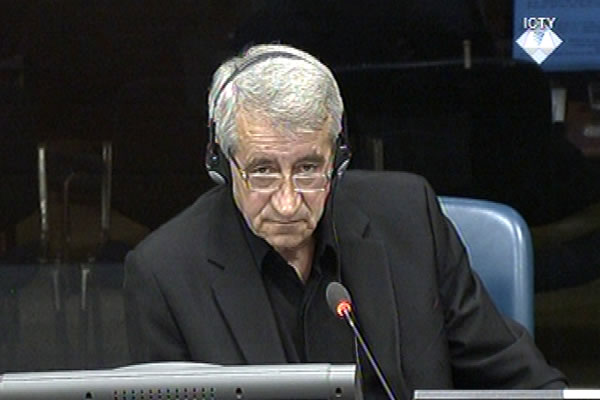Home
MUSLIMS FLED IN FEAR OF MUSLIMS
VRS officer Milovan Lelek claims that Muslims were leaving Rogatica in fear of their extremist compatriots, who did not like the fact that the two ethnic groups were able to live side by side in good terms, The prosecutor countered his claim with the evidence on the expulsions of civilians by the Serb authorities from those villages where the residents were loyal to them
 Milovan Lelek, defence witness at Rako Mladic trial
Milovan Lelek, defence witness at Rako Mladic trial Former officer in the Rogatica Brigade Milovan Lelek gave evidence in the defense of General Ratko Mladic. Lelek claimed that during the war Muslims were fleeing Rogatica in fear of Muslim extremists. According to the witness, the residents in about 10 Muslim villages were loyal to the new Serb authorities. Those villages received regular supplies of food for people and livestock and other necessities, such as fuel for agricultural machinery. Lelek’s evidence paints an idyllic picture of wartime Rogatica, marred only by the Muslim extremists.
Lelek explained that near Satorovici, which was one of the ‘loyal’ villages, the extremists attacked a Serb civilian vehicle. Radenko and Sonja Bjelakovic, a father and his daughter, were killed. The incident caused inter-ethnic tensions in Rogatica, but did not cause a rift. The Muslims nevertheless decided to leave the municipality. They were afraid, Lelek noted, of the threats issued by their extremist compatriots: the extremists criticized the villagers for living side by side with Serbs. This was why the villagers in several Muslim villages wanted to move out to the territory under theBH Army control and the Serb authorities met their requests.
To counter the witness's allegations, in the cross-examination prosecutor MacDonald showed evidence on the expulsion of Muslims from Rogatica and the neighboring villages. The very same villages had, according to the witness, pledged their loyalty to the Serb authorities at the beginning of the conflict. The prosecutor also showed the judgment handed down by the BH State Court convicting Bosnian Serb Radislav Ljubinac of forcible transfer of women and children in Seljani, a part of Rogatica, in 1993. The prosecutor also showed an article published in the New York Times in 1994, which quotes statements made by the villagers from Satorovici and Burati. The villagers say that the Serb authorities and the army ordered them to leave their homes. Lelek nevertheless remained adamant that the Muslims had left voluntarily, only because they were afraid of Muslim extremists.
The prosecutor alleged that the ‘voluntary departure’ consisted of non-Serb civilians being taken to one of the four prison facilities in Rogatica – Rasadnik, Sladara, the parish house and the High School. From there, they were either ‘exchanged’ for Serb soldiers or were simply expelled. The witness argued that the civilians were put up in those facilities at their own request. Those were reception centers, not prison facilities. They spent some time there before leaving for the territory under the BH Army control. This prompted the prosecutor to show a list drafted by the Drina Corps which contains names of women who are classified as prisoners of war in the Rasadnik prison camp. One such prisoner of war was Hanka Kustura, a 101-year old woman.
According to Lelek, civilians were not detained. They were temporarily put in reception centers before ‘leaving the area voluntarily’. In an attempt to explain why the Drina Corps documents list women, including a 101-year old woman, among the prisoners, the witness came up with a theory. In all likelihood, the Serb authorities allowed the civilians to move out of Rogatica to the territory under the BH Army control. However, the civilians were not welcome there because they were criticized for living side by side with the Serbs. In a bid to help the Muslim civilians to leave voluntarily, the Serbs from Rogatica classified them in documents as prisoners of war. Those civilians could then be exchanged, and the Muslim authorities couldn’t refuse it.
Ratko Mladic’s trial continues tomorrow. Vojislav Kupresanin, former president of the ARK Assembly, is slated to give evidence tomorrow.
Linked Reports
- Case : Mladic
- 2014-12-09 CRIMES IN ‘GOOD CONDITIONS’ IN MANJACA
- 2014-12-08 WHO ORDERED ATTACK ON POFALICI?
- 2014-12-04 WERE MLADIC'S TROOPS RESPONSIBLE FOR CRIME IN GRABOVICA?
- 2014-12-11 KRAJINA PEOPLE FIGHTING FOR THEIR MONEY
- 2014-12-15 'FULL PICTURE OF THE TRUTH' IN MLADIC'S DEFENSE
- 2014-12-16 WITNESSES ROLL OFF ASSEMBLY LINE
